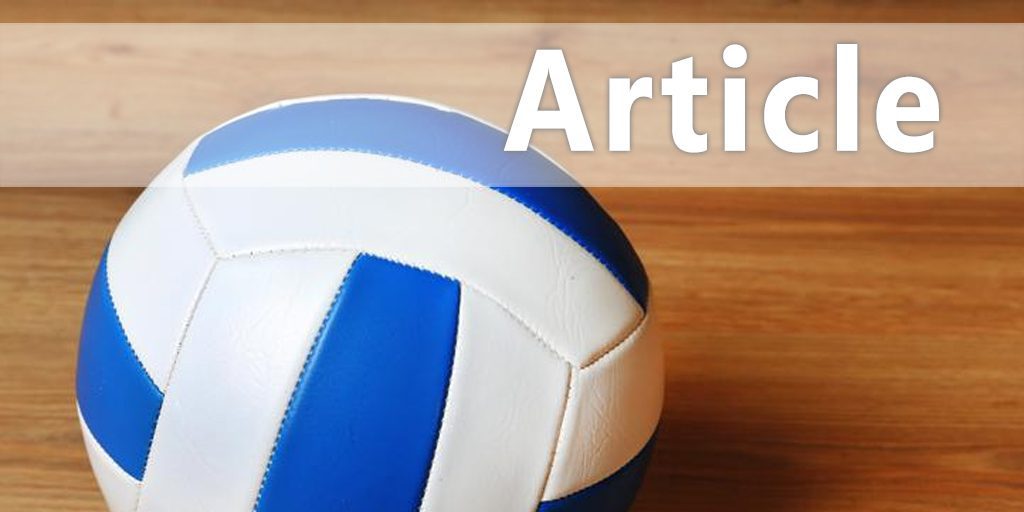|
Know Your Role Coach Brady Starkey - Concordia Univ - as interviewed by Jackson Silvanik
It isn't an easy thing to win a national championship, much less to do so in consecutive years. That makes what Coach Brady Starkey has done at Concordia St. Paul all the more remarkable. Under his guidance, the Golden Bears have strung together an astounding five straight DII National Championships. Such an unprecedented run of success is an indicator of much more than just striking it rich with a special recruiting class. Starkey has built his program into something that has staying power, developing a system and philosophy that emphasizes the strengths of his players and convinces them to set aside concerns about individual stats in a selfless style of volleyball that has persisted from year to year. We caught up with Coach Starkey to learn a little bit about how he helped establish the Golden Bears as a perennial title contender, as well as find out what shapes his approach to the game, his thoughts on recruiting, training and developing a system. We also spoke with some of his former players about what it takes to be part of a volleyball dynasty. Talk a little bit about your coaching career. My interest in volleyball started out in the 6th grade, which is strange for a kid from Minnesota, where there are barely any volleyball opportunities for boys. We had a 6th grade teacher that was obsessed with the sport and would take a half hour a few days a week and teach us the skills of the game. I kept up with volleyball, playing open gyms with adults at my local park, but never played club because I played hockey and other sports. When I started college at the University of Minnesota, I played every day and started playing USAV with a men's team and really got addicted to the sport. I eventually started playing with some guys who played in college and some coed with women who played in college and they really took me under their wing and showed me the game. One of the women I played with, Chris Denson, was the head coach at Minnetonka High School. She asked me and one of my buddies if we wanted to coach there. We thought it would be a fun experience, so he took the JV job and I took the B-squad job. I loved it from day one. I loved how excited the kids got when they learned something new and how hard they would work to get better at it. My next job came as the assistant coach at the University of St. Thomas under head coach Dave Orren. I was his assistant for five years, the interim coach for a year with my wife Penny Starkey, and also coached there one more year as an assistant. When I was an assistant at St. Thomas, Dave Orren was a great mentor to me. After my last year coaching at St. Thomas, my friend Geoff Carlston had just taken the head coaching job at Concordia University and was in need of an assistant, so he hired myself and the former U of M setter Becky Bauer. I was Geoffs assistant for three years before he took the head coaching job at Ohio University. With help from Geoff and the current players, the AD took a chance on me and hired me as the head coach and I have been here for the last nine years. What kinds of things did you deal with transitioning from an assistant coach to a head coach? I had a pretty smooth transition moving to the head coaching position because I already knew the players and parents well. When Geoff left and I got the job, we were really on the verge of becoming a pretty strong program, so I was really not planning on making some crazy override with how we were doing things. Geoff and I really saw eye to eye on a lot of the same coaching techniques, defensive philosophies and what we wanted our culture on the team to be like. From Geoff I learned how important it is to be diligent in holding the girls to their highest standards in making changes in skills and how they perform in matches. I was a bit more laid back and not as intense, especially during matches. I re-ally tried to let them go out and play and do their thing. You've had a lot of success in terms of having your players receive national recognition—what kinds of things contribute to this consistently high level of play? Our players do get a lot of awards, but we really don't get caught up in that too much. They know that if our team does well, those things will come. I think a big reason for our high level of success is because of the system and the balance that we have. We have had strong ball control over the years that really allows our offensive system to spread the ball around and creates a lot of one-on-one opportunity for our players. Our system has us sharing the ball with everyone and that makes us difficult to defend. Our players hit for pretty high percentages and that helps them get a lot of national recognition. Our players are talented in their own right, but they are great players within our system.
What does a typical Concordia practice look like? Our practices emphasize playing as much as possible because we feel playing in real games is where you really turn yourself into a great player. Our players love to compete, so we use that against them, basically explaining that if they focus and are diligent with what we need to get done that day in the skill parts of our practice, then they will get to play longer that day. About 99% of the time, they really put it out there trying to improve and remain focused during our skill development, which means that they are fun to coach and can accomplish a lot in a shorter amount of time. Our practices start out with all the basic skill work in stations and are pretty much the same every day. Our setter trains on another court, the rest of the team does ball control progressions and footwork. From there, we do arm-swing training on the box and our liberos work on individual defense. Then, we serve and serve receive for a big portion of our skill development. Last, we do our hitter training, blocking and our team defense together, always doing these against live players. We feel this is the best way to really train our players how to score and defend. Finally, we compete, splitting our team up and play as many 15-point games as we can that day. I walk the court and my assistant, George Padjen, plays to up the intensity because they like trying to show him up. Between plays we point out volleyball IQ moments, or stop and ask them what they were seeing and why they did what they did on that play. We really try to teach them the game and have them understand why we want them doing things a certain way and what the best plays are that they can make in different situations. Our games are intense because our girls are competitive, but they love to play.
How involved are you in the recruiting process? Our players are the true selling point for our school. Every kid we have on campus raves about our players, no matter if they like our school or not. They can also expect brutal honesty and a lot of humor, because that is pretty much the only way we do things here. Our players and our recruits all know where they stand at all times. That way they have all the cards on the table and they can make the decision if they want to be a part of our program. Personally, I always like to know things and I feel like recruits, parents and our current players all deserve the same respect. It works out well because if a recruit is turned off by this, then we know that they were not the right fit for our program and they would struggle here. If they buy in, then usually they end up being the tough, hardworking kind of kids we are looking for. After the recruits leave, we ask our players what they think and if they think they would be a good fit for our program. We take their comments seriously, because they know what we are looking for and sometimes recruits will feel more comfortable talking freely to players more than the coaches.
You've managed to win championships in spite of player turnover... what kind of things contribute to this? How flexible are you in terms of adapting your systems and philosophy to your players, or do you recruit with that in mind? What do you try to get your team to "buy in" to? When we started out, we really had to focus on being a perfect ball control team and a great defensive team that had to outwork teams because we did not have balance in our offensive game. The older players that we had really created a great culture of work ethic and fighting hard and competing for every point in order to beat teams. Eventually, we started getting more players that could terminate balls efficiently, so we really became a very balanced offensive team. Our teams that have had this run of championships have maintained our culture of great ball control, defense, hard work and competitiveness. When they are on, they are fun to watch because they are a great combination of kids that can terminate in a one-on-one situation and kids that can pass, defend and compete like they want to win every point. When you hear people talk about teams that are really good, you mostly hear them talk about how great their hitters are. But if you watch the teams that usually win it all, it's because they not only have great hitters, but their ball control, setting and defense is great also. So for us, we are really not that flexible in changing our system because we feel it is what makes us a consistently strong team. We recruit kids that will fit into our system and kids that will be able to fill the holes that we lose every year. The kids that we bring in will get to play against a strong team every day in practice so they are very well prepared to fill the roles of the players that were ahead of them. The biggest philosophy that we try to get kids to buy into is that they are all very good players, but they are great players when they play together as a balanced team. If you watched our team in warm ups, you would not be overwhelmed by many of them, but in matches they stand out because of their ability to terminate in our system. We try to explain that you don't need to be unbelievable and carry our team, you just need to play your role and our team will have success because of the balance that we have. This does a good job of taking pressure off the kids who feel like they have to play perfect and you can sense when they play that they are very relaxed and having a lot of fun. What qualities do you look for in both assistant coaches and administrative staff? Well, for us, we only have George and myself. Some years we have a volunteer that can make practice, and for a while George was only part-time. A few years ago George became full-time so we divide up the responsibilities a bit more now. I am responsible for the day-to-day stuff like budget, travel, gear and uniforms, as well as most of the recruiting correspondence. Fundraising money for our program is a big part of our job, so every year we put on the Lutheran Junior High School basketball tournament and George is responsible for that. He is also responsible for doing everything for our camps and part of his job at CU is serving as the intramurals director. We also both evaluate a lot of players. When I got the job, I was surprised at all of the busy work that seems to make up the majority of our job; the fun time in the gym at practice is a pretty small amount of time. I love being in the gym practicing; it is the best part of our job. The busiest time of the year for us is definitely the fall because we are in-season and we also spend every night at matches evaluating players at all of the high school matches. Was building a sort of volleyball dynasty always a goal for you? Building a dynasty has never been a goal for us; we have always wanted to be a program where our players had a great experience. I love to win as much as the next person, but I never thought we were going to win one championship, let alone five. If you ask our players though, they would tell you that their goal is to win every point; they are not shy about it. When Geoff first got the job at CU, we went and watched the Elite 8 that was played at Augustana and I remember thinking that we had players with abilities like this in Minnesota. So our first pitch to players was, "Do you want to come be a part of something great that you had a hand in starting and building?" A few of them said yes and that is how it all started. When I took over, I knew we were going to have a strong team that year, but when they ended up being the national runner-up, I was surprised. That was the moment that I thought we could end up having a team that could consistently compete on the national level. The success of the program as well as the players having positive experiences has made it possible to get the players needed to sustain the success. Having a solid relationship with Athletic Department staff and school administration is crucial for long-term viability of a program. What kind of things help to foster good relations? What kind of advice can you offer other coaches in terms of maximizing their resources? I think honesty, hard work and not constantly complaining goes a long way in forming good relationships with staff and administration. People don't want to hear you complain about what you don't have; they want you to go do the best you can with what you do have. If you do well or better with what you do have, it makes people want to help you more and do more for you. I think you have to let your administrators know your needs, but after that, you have to do it with what you have. We really started out with very little and over time we have gotten more help from our administration in order for us to maintain the success we have had. If you go and do the work and make your program better and they still won't help, at least you have made yourself more marketable to a potential future employer. Everyone always wants more resources, but it goes a long way if you can go out and earn it.
|
||||
|
|






